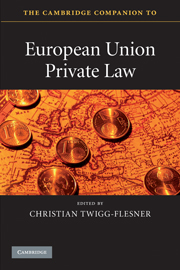Book contents
- Frontmatter
- Contents
- Preface
- List of Contributors
- Table of cases
- Table of legislation
- 1 Introduction
- 2 The historical evolution of European private law
- 3 European private law and the comparative method
- 4 The role of the conflict of laws in European private law
- 5 Competence and European private law
- 6 Language and terminology
- 7 European private law by directives
- 8 The European Court of Justice as a motor of private law
- 9 European contract law
- 10 The way forward in European consumer contract law
- 11 Commercial contracts and European private law
- 12 European tort law
- 13 European Union property law
- 14 Information obligations and withdrawal rights
- 15 Travel law
- 16 Unfair contract terms
- 17 Unfair commercial practices and European private law
- 18 Consumer sales and associated guarantees
- 19 Product liability
- 20 Commercial agency in European Union private law
- 21 EU competition law and European private law
- 22 Non-discrimination and European private law
- 23 Financial services in European Union private law
- Further reading
- Index
2 - The historical evolution of European private law
Published online by Cambridge University Press: 05 July 2015
- Frontmatter
- Contents
- Preface
- List of Contributors
- Table of cases
- Table of legislation
- 1 Introduction
- 2 The historical evolution of European private law
- 3 European private law and the comparative method
- 4 The role of the conflict of laws in European private law
- 5 Competence and European private law
- 6 Language and terminology
- 7 European private law by directives
- 8 The European Court of Justice as a motor of private law
- 9 European contract law
- 10 The way forward in European consumer contract law
- 11 Commercial contracts and European private law
- 12 European tort law
- 13 European Union property law
- 14 Information obligations and withdrawal rights
- 15 Travel law
- 16 Unfair contract terms
- 17 Unfair commercial practices and European private law
- 18 Consumer sales and associated guarantees
- 19 Product liability
- 20 Commercial agency in European Union private law
- 21 EU competition law and European private law
- 22 Non-discrimination and European private law
- 23 Financial services in European Union private law
- Further reading
- Index
Summary
Introduction
Today, Europe is in the process of creating a new common law; and to a certain extent this is not a new situation, but rather a return to how things used to be, as for many centuries a ius commune, a common law, dominated Europe. It may even be that future generations, looking back at our times, will see the nineteenth and twentieth centuries as nothing but a temporary interruption in the history of this common law of Europe.
The early Middle Ages:
The Romans excelled at two things: fighting and law making. The crowning achievement of the latter, however, arrived rather late. In the sixth century the Emperor Justinian had a compilation of Roman law made, the Corpus iuris civilis (the body of civil, that is, Roman, law). By then, Germanic tribes had overrun the west of the empire and they preferred their own customary law over the sophisticated Roman law of the Corpus. Likewise, the conquered Roman population had a law which was Roman in origin, but was just as primitive as the law of the Germanic tribes. Very few Germanic customs have been written down, and those that were, above all reveal the poor quality of the law at that time. When around 800 ad Charlemagne ruled an empire which incorporated a large part of western Europe, he tried to bring more legal unity, though without success. After all, the needs of contemporary society were best served by local and customary law.
- Type
- Chapter
- Information
- The Cambridge Companion to European Union Private Law , pp. 20 - 32Publisher: Cambridge University PressPrint publication year: 2010
- 1
- Cited by



